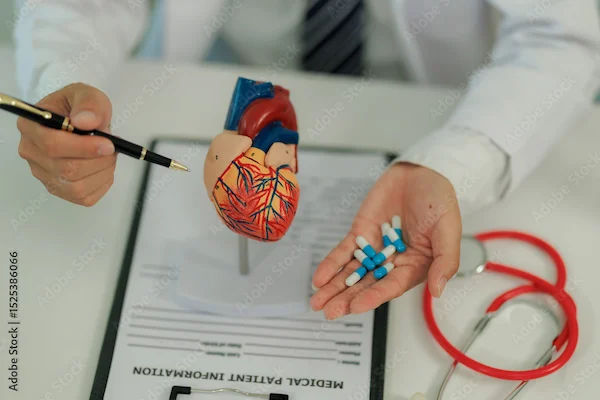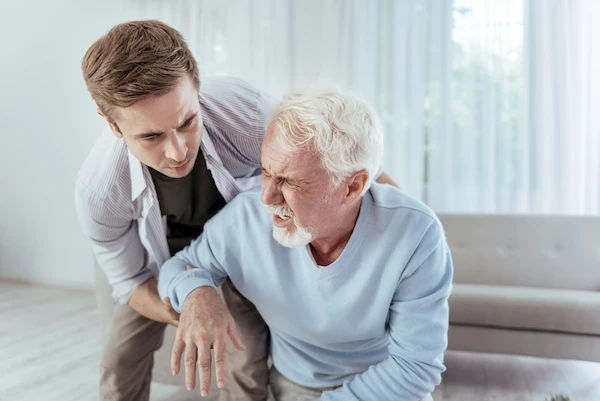- male
- 50 Years
- 31/03/2021
How do you stop a heart attack immediately?
Answered by 1 Apollo Doctors
Acting quickly can save lives. If given quickly after symptoms, clot-busting and artery-opening medications can stop a heart attack, and having a catheterization with a stent put in may open a closed blood vessel. The longer you wait for treatment, the more chances of survival go down and damage to the heart goes up.
Dr. Kareemulla Suggests...
Consult a Cardiologist
Answered 04/07/2025
0
0


Ask Apollo
AI powered Health Chatbot
-
Recognizing Heart Attack Symptoms
- Look for chest pain, shortness of breath, sweating, nausea, and discomfort in the upper body.
-
Immediate Actions to Take
- Call emergency services immediately.
- Chew and swallow an aspirin if not allergic, as it helps thin the blood.
- Rest in a comfortable position while waiting for help.
-
Avoiding Harmful Actions
- Do not drive yourself to the hospital or ignore symptoms.
-
Emergency Medical Treatment
- Be aware that treatments like clot-busting drugs or procedures may be used at the hospital.
-
Importance of Timely Response
- Quick action can save heart muscle and improve survival chances.
-
When to Seek Preventive Care
- Regular check-ups and managing risk factors are crucial to prevent heart attacks.
-
Relevant Medical Specialties
- Consult a cardiologist for heart-related emergencies and follow-up care.
-
Medications Commonly Used
- Aspirin is an immediate measure; other medications are administered by healthcare professionals.
Recommended next steps
Consult a Cardiologist
Answered 20/08/2025
0
0
More Cardiology Health Queries
View allI'm having this sharp pain in my chest, kind of in the middle but a little to the left, but it really only hits when I move my shoulder forward. Lately, I've also noticed this chest pain and feeling of unease when I'm lying down, though it seems to go away if I start walking or just stand up. I'm getting a bit worried. Could this be related to my heart or lungs?
It sounds like you may be experiencing musculoskeletal chest pain, especially since the pain worsens with shoulder movement. However, given your recent chest pain and uneasiness while lying down, it's important to rule out any heart or lung issues. I recommend you take an over-the-counter pain reliever like ibuprofen (e.g., Advil) for the musculoskeletal pain. If the chest pain persists or worsens, or if you experience any other concerning symptoms, please seek medical attention for further evaluation and possible imaging tests like an ECG or chest X-ray.
Answered by 1 Apollo Doctors
Hey, I had a heart attack three months ago and I initially thought it was just a gastric issue, so I didn't go to the hospital right away. I was working normally until I went in for a routine check-up a few days later and they told me I had a heart attack. They did an angioplasty and put a stent in my LAD, and everything seemed to go well. Now, I'm doing a morning walk every day, around 6 km in an hour. I'm a 47-year-old guy and I'm just wondering, when would be a good time for me to go for a stress echo?
Given that you had a heart attack three months ago and have since undergone successful angioplasty with stent placement, its important to follow your cardiologist's advice for follow-up care. Typically, a stress echo is recommended several months after the procedure to evaluate how well your heart is functioning under stress and to ensure that the stent is working effectively. You should consult with your cardiologist to determine the best timing for this test based on your individual recovery and health status. Its great that you are walking daily; continue following your doctor's guidance on physical activity and medication.
Answered by 1 Apollo Doctors
I had this pinching pain in my chest last night, and it slowly spread across the left side. It was there for about 20 minutes and then just vanished. Should I be worried about this?
pain in the chest probable cause could be due to angina,an ECG and troponin T test and CPKMB is advised
Answered by 1 Apollo Doctors
Disclaimer: Answers on Apollo 247 are not intended to replace your doctor advice. Always seek help of a professional doctor in case of an medical emergency or ailment.




